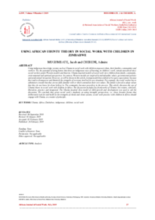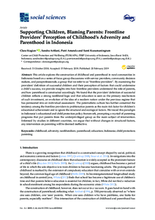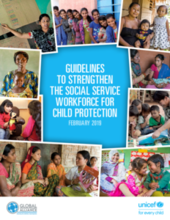Displaying 201 - 210 of 505
This study aimed to identify the interrelationships of risk and protective factors, job satisfaction and burnout to child protection workers' intent to leave, the relative impact between job satisfaction and burnout on intent to leave, and their mediating roles for the risk and protective factors.
Drawing on in-depth interviews with fifteen community workers, who represent nine agencies assisting families with child protection issues in a small jurisdiction in Australia, the authors of this article show how the stigma attached to ‘bad’ parents is passed on to the community workers who are supporting them.
This research addresses one of the most pressing and controversial issues facing child welfare policymakers and practitioners today: the dramatic overrepresentation of Indigenous families in North American public child welfare systems. The article presents a successful model of inclusive education: the Center for Regional and Tribal Child Welfare Studies (the Center) at the University of Minnesota, Duluth, School of Social Work.
This study explores the qualitative responses of child welfare workers in Florida to understand their collaboration experiences, focusing specifically on their perceptions of facilitative factors of collaboration with Intimate partner violence (IPV) services.
This article discusses the use of Ubuntu theory in social work with children in Africa.
This open access article explores the construction of childhood and parenthood in rural communities in Indonesia based on a series of focus group discussions with service providers, community decision makers, and paraprofessionals; a group that the authors refer to as “frontline providers”.
This article examines the professional identities of family therapists employed by Family Counselling Services (FCS) in Norway and their experiences providing therapeutic services to parents whose children are placed in public care.
This paper reports on innovative research methods using GPS [Global Positioning System] devices that can trace social workers' mobilities and explore the use of office space, home working and visits to families in two English social work departments. This article presents unique findings that reveal how mobile working is shaping social care practitioner wellbeing and practice.
This study explores the lived experience of child welfare worker turnover from the child's perspective, adding an important and underrepresented voice in the literature.
These guidelines are informed by evidence of ‘what works’ and lessons learned in the field. They are designed to accelerate UNICEF regional and country offices’ programming on social service workforce strengthening, and support work to better plan, develop and support the social services workforce with national and regional partners.



